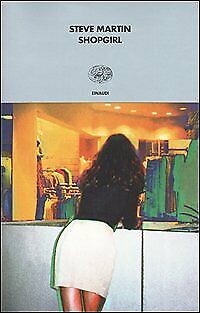Influenced by Steve Martin§
by Russell Dyer
published: jan 15, 2018; revised: jan 17, 2018; readers in past month: 622
A friend of mine recently saw the movie, Shopgirl from 2005, starring Claire Danes and Steve Martin. It was closely based on a novel, with the same name, written by Steve Martin, published in 2001. My friend said that the movie reminded her of my novel. She said, “It made me think how much I liked your book and how much deeper are your characters.” I found it interesting that she made a connection between Martin’s novel and mine.
Before seeing the movie myself, many years ago I listened to the audio version of Martin’s novel that he recorded — I think it was in 2001. Although I liked the novel, I don’t recommend it to all readers, nor the audio recording. There is a stiffness to the story, especially the way Martin reads it. He didn’t seem to have called upon his acting talents for the audio book.
Now that I think about it, though, Martin’s novel and his audio recording probably influenced me when I wrote my novel, I Have No Friends — also known as The Loneliness of Lena. Its influence was so subtle, I was unaware of it at the time. I also now suspect that his book is what led me to write my novel with a female protagonist. And it was Steve Martin’s voice that became the narrator of my novel in my head as I wrote it. I can feel and hear that narration now. I didn’t know it, though, until my friend observed a familiarity between our two novels.
The way Steve Martin reads the text of his novel, for the audio recording, is like that of an anthropologist narrating a documentary about a shop girl. Similarly, my method of protecting myself since I was a boy has often been to stay removed from others and to observe them as would an anthropologist. That’s probably why I liked Shopgirl. Throughout my adult life, this method has been a way to approach and understand women. It’s interesting, incidentally, when we uncover the psychological origins of our feelings and behavior.
The protagonist in Shopgirl, Mirabelle, is played by Claire Danes. Her character is very much the focus of the story, while Steve Martin’s character, Ray, although very present, is much lesser. I don’t think it was arbitrary which role Steve Martin played in his own story. He couldn’t play a woman role, of course, but he wrote a lesser role for Ray, the character for which he seemed to have envisioned himself playing. He said in an interview with The Telegraph in 2006, “Anything you make is partly autobiographical, but the story is not based on me.” He does indicate in the interview that he has dated women like Mirabelle and that he identifies very much with the character Ray. He also said that he had experiences similar to those of the other male character Jeremy, played by Jason Schwartzman. However, related to the protagonist he says that “Mirabelle is a pastiche of people I’ve known; and when you live in Los Angeles you drive around and you look at all these shop girls and kind of fantasize about their lives.” So it seems that for Steve Martin, the personalities of these women — maybe all women — are somewhat foreign and he may often feel like a spectator that sometimes benefits from their affections — hence his role in the film compared to that of Mirabelle.
My friend also observed that my novel “is more realistic and seems like a young woman wrote it.” In my novel, I am the two main, albeit women characters. My personality is also present at times in many of the minor characters. That’s perhaps the main difference: Martin is an observer and a supporting and a subjective character, while I am almost all of the characters to some extent. I am all of the women characters and none of the men. This is me and always has been me: I was raised by women; almost all of my friends are women; I am usually with women.
In Martin’s novel, men surround the female protagonist. Other women in his novel are incidental culprits in a male world in which she navigates and struggles against. In my novel, women are equal to the men. There are very few scenes with men and they have very little to say. My protagonist, Lena struggles against herself, far more than against others. She ignores, appeases, or dispatches male antagonists. She doesn’t let them dominate her.
Although Shopgirl seems to have influenced me and gave voice in my head to the narration as I wrote the story of Lena, it did not direct or influence Lena’s story. Mirabelle and Lena are vastly different characters: How they handle themselves and others, as well as how they perceive themselves and others is not the same in any way. As for their authors, Martin seems to be telling the story of a young woman he knows or created, whereas I am telling my own story through the persona of a young woman.
